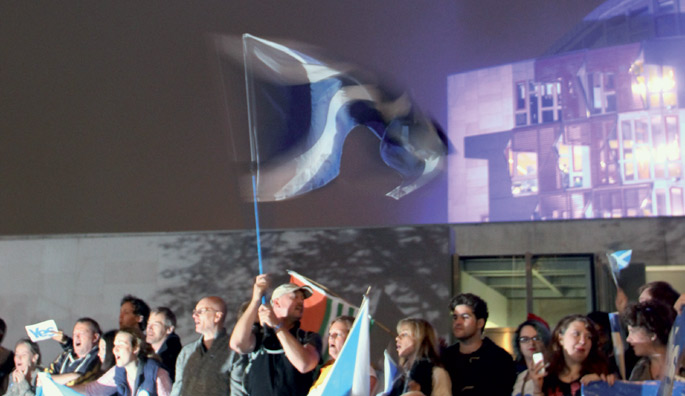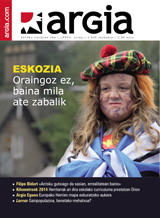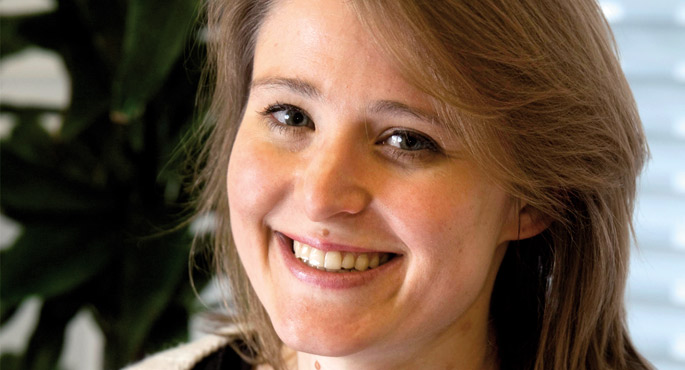Sleep hasn't died
- The "no" vote in the Scottish independence referendum won 55.3% of the vote, with a greater difference than the one envisaged in the surveys. Now it remains to be seen how London is going to deliver on the promise of giving new powers to Scotland.

Beyond all the positive elements that the Scottish referendum is going to leave and leave, the first record, the most obvious one, is that independence has not succeeded in convincing enough people to get their project going. It has been close, but, of course, it has lost competition. And it is worth emphasising the reasons, at least the main one. The Unionists have shaken the ghost of fear throughout the campaign and, in the end, brought them good results. In the meantime, the independentists in Scotland have not been able to demonstrate their assurances for the future. That is what runs counter to independence, in Scotland and elsewhere: it works on a hypothesis, on something feasible but which is not tangible today. What unionism proposes, better or worse, is known. On the contrary, independence must be imagined. In this field of play, trust is the most effective tool for those who want to achieve an independent state, to convey confidence, for the project to arouse and receive the necessary illusions. In Scotland, of course, fear has prevailed over illusion. And that should give lessons to the rest of independentisms, if you don't want to hit the wall of fear over and over again.
In any event, it is essential to applaud and value the democratic exercise that the Scots have done. On the one hand, because the right to decide has been exercised naturally, letting citizens decide their future. On the other hand, and perhaps more importantly, because the vast majority of society has been involved in the process. The writer Irvine Welsh, in her letter “Glorious Failure” from The Guardian, states that “the Scots have reinvented and reinvented the idea of real democracy.” And, to a large extent, that's right. The participation of 86% of the census, beyond a high number, has meant the return of the sectors not voted for decades. Those who believed that they had nothing to say in the political decisions, on this occasion they did feel part of the decision. The process has been inclusive, to a large extent, thanks to left-wing movements that have taken the campaign to the gates of working-class neighborhoods.
The referendum campaign has shaken Scotland's political culture for two years and affected Scotland. Some say it has changed forever. In a society used to putting the political game in the hands of the parties, there are thousands of people who have been involved in the process and have participated directly. Above all, the social mass activated by the block in favor of the self stands out. They have won the street war remarkably, and perhaps that has been one of the elements that has kept alive until the last moment the possibility of winning at the ballot box.
Regardless of the identity case, the 'yes' campaign has focused on the construction of a new, fairer social model, moving away from Westminster's conservative and privatizing policies. That is where a large majority of Scottish society agrees, which voted yes or no in the referendum. And mindful of this, and alarmed by the trend of the self-pro-self polls, London promised to give Scotland more power.
Perhaps we will never know if the last maneuver of the Better Together campaign was improvised or premeditated. But it has clearly worked. He has not won the referendum, but the chief deputy minister of the Scottish Government – and on a provisional basis, in place of Salmond – Nicola Sturgeon, pointed out in a tweet that “Status Quoa has not been supported”. That is why it would perhaps be fair to say that, rather than the yes or no, the third option has won the consultation. The Scots who have not voted, at least many of them, have not voted blindly to maintain the status they had until now. Far from that, they've given Westminster another chance. Cameron must be able to take advantage of it from now on.
For the time being, it is clear that it has gained time. But you might think it has fallen into the network that he himself built, because together with Scotland he has also devoted new competences to England, Wales and Northern Ireland. The British Prime Minister has made it a condition for the process of Scottish autonomy to take place at the same pace as the processes of three other nations, which necessarily delays the former. The Labour Party has already hinted that it does not see with good eyes a parliament of its own for England, where it would not have enough strength, for the benefit of the Tory. Former British Prime Minister Gordon Brown, one of the most well-known faces of the "no" campaign in recent weeks, has reiterated that "London will keep its word with Scotland". But the debate among the major Unionist parties has already been opened on how to develop the process. And, as long as no agreement is reached, the process of reinstating powers to Scotland will necessarily be prolonged. The situation has led to mistrust in Scotland and Salmond has already said that those who did not vote have been "deceived". Surely, it is still too early to deduce any of this. But the fact remains that what the transfer of powers promised by London will do remains to be seen, and it is also true that the Scots are not going to accept decaffeinated autonomy.
At the moment, and as is normal, the sense of failure remains the dominant tonic among the Scottish independentists. But what they have in their favor is a lot. According to the referendum, the new generations are in favour of independence. Furthermore, and contrary to what one might think, failure has not reversed the citizens who have mobilised themselves during the campaign. Since 18 September, 4,000 and 1,200 citizens have joined the SNP and the Green Party respectively, and another 4,000 have advanced their participation in the Radical Independence Campaigne conference in November. On that basis, independence has sufficient reason to move forward. Salmond said in his greeting that “sleep will never die.” For now, it's still alive. And it may only be a matter of time for this dream to be fulfilled, because if London continues to be in line with the policies so far, it will be moving further and further away from the Scots interested in building a new social model.
Holyroodeko parlamentutik gertu, Edinburgon, letra handiz ageri da Eskoziako independentziari buruzko erreferendumaren data. 18 September 2014. Gaur, data bera agintzen dute egutegi eta agendek. Iritsi da eguna, eta etorkizuna erabakitzera doaz eskoziarrak. Galdera bakarra da, eta argia: “Independente izan beharko litzateke Eskozia?” Eta erantzunak, bi baino ez, bai ala ez.
Baiezkoaren zein ezezkoaren aldeko ekintzaileek azken unera arte luzatu dute kanpaina. Estu daude inkestak, eta azkeneko botoak ere izan dezake eragina emaitzan. Independentistek bukaerara arte eutsi diete bi urteotako kanpainako argudioei. Aspertu dira bozkatu ez duten gobernu baten –Erresuma Batuko Gobernuaren– politika neoliberalak jasateaz. Eredu sozial justuagoa nahi dute martxan jarri, eta ezinbestekoa dute horretarako Westminsterren atzaparretatik askatzea. Ezezkoaren aldeko kanpainakoek, beldurraren diskurtsoa erabat alboratu gabe, azken txanpan egin dute lehenbiziko proposamen sendoa. Ez dute gehiegi zehaztu, baina eskumen berriak agindu dizkiote Eskoziari, ezetzaren alde bozkatuz gero. Maniobra erabakigarria izan daiteke. Izango da.
Gaur, batzuk zein besteak, hautestokietan kokatu dira, azkenengo botoa ere borrokatzeko. Egun arrunta da Eskozian, eta lanera sartu aurretik edo ondoren eman dute bozka herritarrek. Goizeko 7:00etatik gaueko 22:00ak arte, hamabost ordu dituzte bozkatzeko, eta jende kontzentrazio handirik gabe ere, etengabea da botoa ematera doazenen joan-etorria. Independentistak sinetsita daude baiezkoaren nagusitasunaz. Azken aste eta hilabeteetan kalean lortutako aktibazioak garaipenean sinesteko arrazoia eman die. Margaret J. Campbell idazlearen kasua da. Bozkatu berri du, eta irribarretsu doa etxerako bueltan. Unionismoak garaituz gero zer gertatuko den galdetu diogu. Baita bitan galdetu ere. Baina erantzun bakarra du ahoan, behin eta berriro: “Baietzak irabaziko du”.
Edinburgoko kaleetan ez dago aparteko girorik. Kanpainako ekintzaileak bozkalekuetan kontzentratzen dira batik bat, eta Europako estaturik gabeko nazioetatik etorritakoentzat utzi dituzte kaleak. Sardinia, Korsika eta Flandeseko banderak ikusten dira, kalerik kale. Euskal herritarrak, trikitixa eta guzti, kantuan eta dantzan ari dira Royal Milen. Eta katalanek, Eskoziako bandera eta estelada osatu dute kandelekin, katedralaren pareko plazan. Bertatik pasa da gazte bat, No, Thanks txapa bularrera lotuta. Argi azaldu du ezezko botoaren zergatia: “Hamar urte pasa ditut lanean nire dirua aurrezten, orain dena galtzeko? Ez horixe!”. Beldur da Eskozia independente baten aurrean. Horixe izan da ezezkoaren aldeko kanpainaren helburua, beldurra sortu eta zalantzak piztea.
Gau luzea aurretik
Alea jacta est. Gaueko 22:00etan itxi dira bozkalekuak, eta dagoeneko gauzatu dute eskoziarrek erabakitze eskubidea. Gau luzea dator aurretik, botoen kontaketarako prozedura berezia hautatu baita: galdeketa mahai bakoitzeko botoak Eskoziako 32 hauteskunde esparruetako bakoitzean zehaztutako gunean zentralizatu beharko dira. Batzuk helikopteroz edo itsasontziz eraman beharko dira puntu horietara, Eskoziako irla urrunetatik. Gero, gau osoan zehar egingo dira publiko esparru horietako datuak, banan-banan, eta goizeko 6:00etarako aurreikusten da azkeneko emaitza.
Asko dira gaua esna eman duten eskoziarrak, telebistari itsatsita. Beste batzuk goizeko ordu txikitan jarri dute iratzargailua, azkeneko emaitza jakiteko. Une batetik bestera alda daiteke Eskoziako historia. Esnatu direnerako, ordea, aurreratu samarra dago kontaketa. Ezezkoa nagusi da Eskoziako barruti askotan. Glasgowen, Eskoziako hiririk handienean, independentziaren aldeko jarrerak irabazi duela jakinarazi dute goizeko 6:00etarako minutu gutxi falta direnean. Arnasa hartu dute independentistek, baina ez behar beste. Aldea 25.000 botoena baino ez da izan Glasgowen, eta ez da nahikoa ezezkoak hartutako distantzia eteteko. Gainera, Edinburgoko datuak falta dira oraindik, eta jakina da unionismoa gailenduko dela hiriburuan. Baita alde nabarmenez ere: %61eko babesa lortu du ezezkoak. Erabakita dago guztia, oraindik Highlands-etako datuak falta badira ere. Ezezkoak irabazi du erreferenduma, eta segidan datoz batzuen negarrak eta besteen poz algarak. Eskozia ez da, momentuz behintzat, estatu berri bat izango. Hala erabaki dute bere herritarrek.
Goizean, euritsu esnatu da Edinburgo. Kalean normaltasuna da nabari, edozein ostiralen antzera. Esan liteke ezer ez dela pasa. Desagertu dira erreferendumari buruzko erreferentzia gehienak, eta inondik ez dira ageri aurreko egunetan batzuk eta besteek zeramatzaten txapak: Yes Scotland. No, Thanks. Bakoitzak bere barrurako gorde du hautestontzian hartutako hautua. Ingurura begiratuz azaldu du egoera Jaquelinek, 55 urteko andreak: “Oso serio daude kaleak, oso isil. Jende askok shocka dauka barruan”. Baiezkoaren alde egin zuen erreferendumean, eta “oso triste” dagoela dio.
Hortik gertu, Meadows parkearen inguruan, bazkalorduko atsedenean daude inguruko eskola militar bateko nerabeak. Uniformea daramate horietako batzuk, Union Jack eta guzti. Ezin izan dute bozkatu, hamabost urte baino ez baitituzte, baina galdetu beharrik ere ez dago zeren alde dauden jakiteko. Louiek adierazi du iritzia, gainerakoek, inguruan, buruarekin baietz dioten bitartean, gora eta behera: “Oso pozik nago emaitzarekin. Uste dut oso ona dela batasunaren barruan jarraitzea”.
Bananduta daude iritziak, erreferendumeko emaitzak bezain beste. %55,3 eskuratu du ezetzak galdeketan, %44,7 independentziarako aukerak. Eta emaitzen aurrean, dimisioa iragarri du Alex Salmond Eskoziako lehen ministroak. Agurrean, independentziaren “ametsa sekula ez dela hilko” adierazi du. Eta mezua ongi jaso dute kaleko independentistek. Baietz bozkatu dutenen artean, inork ez du betirako galdutzat ematen aukera. Sinetsita daude etorriko dela beste erreferendum bat, eta baita irabaziko dutela ere. Baina hori, izatekotan, beste egun batean izango da. Gaur, berriro ere, egun normala baita Edinburgon.
Time passes quickly, even more so after two years so slow and weird by the pandemic. The Scottish Prime Minister, Nicola Sturgeon, announced at the end of June his intention to conduct a further consultation on the country’s independence in October 2023, which leads us to... [+]
Independentziari buruzko bigarren erreferenduma 2023ko urriaren 19an egitea proposatu zuen Nicola Sturgeon Eskoziako lehen ministroak joan den astean. Ezezkoa erantzun dio Boris Johnson Erresuma Batuko lehen ministroak
Eskoziako Parlamentuan egindako hitz hartzean eman du horren berri Nicola Sturgeon Eskoziako Lehen ministroak. Aurkezpenean, kritikatu egin du Erresuma Batuko Gobernuak orain arte ukandako "blokeo jarrera".
Abogatu bezala egiten du lan Txema Monterok. "Nere defendituren batek Frankismoan inork baino denbora gehiago darama... [+]
























